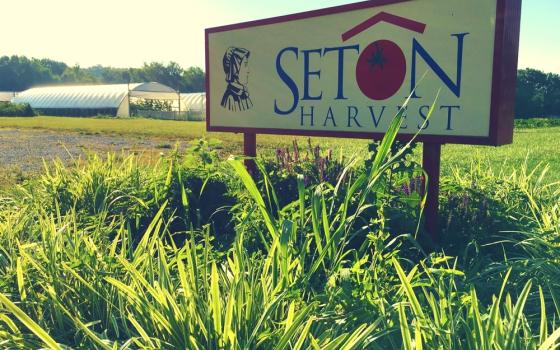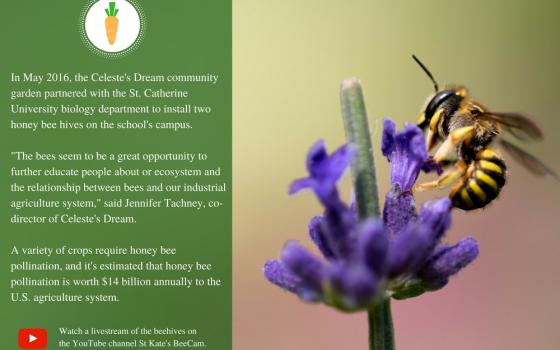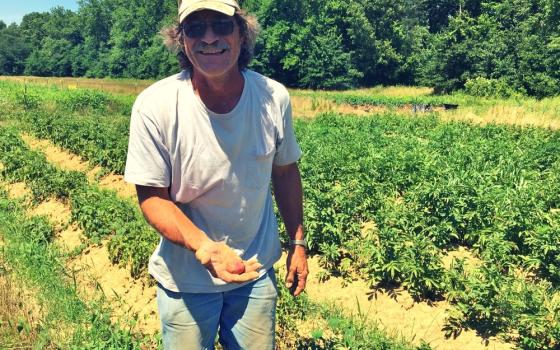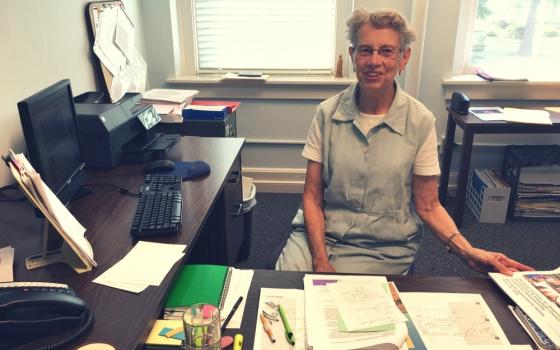Editor's Note: Global Sisters Report often focuses on work that sisters do to help those who are hungry or have food insecurity. This week, as the United States celebrates the feast of Thanksgiving, we focus on sisters who are active in food justice — trying to make sure that everyone not only has enough to eat but also access to healthy choices.
______
At about 7:30 in the morning, Daughter of Charity Sr. Maureen Houlihan drives over to Seton Harvest farm, pulls on a pair thick, rubber boots and carries feed over to her chickens. Technically, they aren't her chickens — they belong to the community owned and operated Seton Harvest — but it's a well-established fact that Houlihan and the chickens have a special bond.
When the chickens see Houlihan coming, they begin cackling and crowding around the gate of their coop in anticipation. But when she actually sprinkles the feed, there's instant silence.
"That shuts them up," Houlihan says with a giggle. "At least for a little bit."
The Daughters of Charity in Evansville, Indiana opened the nine and a half-acre Seton Harvest farm 10 years ago in an effort to provide fresh, pesticide-free food for the local community. People are invited to become shareholders in the farm, which allows them to come every week to pick up some of the 70 varieties of fruits and vegetables grown there throughout the year. Every year, the farm also donates about 12,000 pounds of produce to area food pantries and homeless shelters.
In the last decade, a number of communities of women religious have taken up the mantle of food justice — that is, a local community's right to grow, sell and eat healthy food. Some, like the Daughters of Charity, have started natural farms or community gardens. Others have immersed themselves in agriculture policy on the local, state and federal levels.
Whatever the sisters are doing, it's all in response to a changing food system they believe has stripped food sovereignty from the people. Rather, it's now a handful of multinational food corporations that decide what foods are available in grocery stores.
Reestablishing food sovereignty: Issues of access and education
Lifelong farmer Franciscan Sr. Rita Wienken believes that systemic change in the food system happens in local food markets. Specifically, she believes it comes from reestablishing the local food markets that were destroyed in the so-called food revolution that followed World War II.
"The United States was going to feed the world. But that food revolution was about commodity production: wheat, corn and beans — not about what we really consume, which are vegetables and fruits," said Wienken, who currently serves as the urban farmer for Toledo GROWS, the Toledo Botanical Garden's community garden outreach program.
In her neck of the woods, Wienken says, because of food industry demands, 60 percent of the crops farmers grow are used to feed cattle and chicken — not people — which doesn't make sense to her.
"That's backwards in how you provide calorie food to people," she said. "And then the industrialization. We're going to get rid of the small farmer because industrialization is how you feed the world. But, honestly, that's not true."
About 640 miles away in St. Paul, Minnesota, the Sisters of St. Joseph of Carondelet have come to the same conclusion about local food markets. That's part of the reason why, 11 years ago, they started a community garden on the St. Catherine University campus.
The 1,300-square foot garden, divided between two plots, is a place for fellowship — all the gardening is done communally — but also a place where people can learn about food, which the sisters see as the ticket to empowering people to take charge of their diet in a system that has largely disenfranchised them.
It's with pride that Sr. Jill Underdahl shares that many of student-gardeners who've now graduated and moved away are still growing food and exploring issues of food justice in their new hometowns.
"One woman," chimed in Jennifer Tacheny, co-director, along with Underdahl, of the sisters' young adult spirituality ministry Celeste's Dream, "went on to own land and found an urban farm in Minneapolis."
"This might sound cliché, but people are disconnected from food and certainly from their food source," Tacheny continued. "So just walking someone through the process of an annual cycle with food — from thinking about what you're going to grow, to actually starting seeds, planting a garden, harvesting, sharing the harvest and then how to cook the food — this is a huge part of our education."
Even in Evansville, the rural area around Seton Harvest farm, knowledge about food and the food system is lacking. Houlihan recounts how a young girl came to the farm for a field trip and was stunned to see a potato pulled up from the ground. Julie Dietz, the farm's community outreach manager, shares the story of when she visited a school and a student declared she had never seen a carrot with its leafy green top.
The sisters' goal is to educate and empower kids so they, in turn, can educate and empower their families in the quest for food sovereignty — regardless of their income.
"If you start young enough, you're hoping that something gets in and stays with them," said Sr. Theresa Peck, administrator for the Daughters of Charity' Evansville campus. "Because in a lot of the poorer schools — and maybe the not so poor — they have no idea where food comes from, or about healthy eating or how a farm works. So it's a huge education for the children and their parents."
Pushing, pushing, pushing: Sisters and food justice advocacy
In the affluent St. Louis suburb of Creve Coeur, rows of plush trees all but hide the headquarters from public view. Yet, from the right angle, one can peek behind the trees and the meticulously manicured lawns to catch a glimpse of a sprawling campus that — depending on whom you ask — houses one of the most evil or beneficial agricultural companies on the planet.
St. Joseph of Carondelet Sr. Barbara Jennings has a friendly relationship with Monsanto. She's the director of the Midwest Coalition for Responsible Investment (MCRI), an organization that helps religious communities influence the policies of corporations by becoming shareholders in them. Right now, Monsanto is one of the corporations MCRI members are invested in.
Jennings meets regularly with Monsanto staff to check in with the company's progress on certain environmental and human rights issues, and she also attends the annual Monsanto shareholders meeting in January. Jennings won't go so far as to demonize Monsanto, but neither will she greenwash their practices.
"They have a long way to go, and they know that. And they know that we know that," she said. "And we're going to keep pushing, pushing, pushing."
Monsanto is one of the biggest players in today's U.S. food system. In fact, Jennings jokes that the only way to avoid consuming Monsanto products is to eat an entirely organic diet or to eat nothing at all — because Monsanto's patented seeds are used to grow almost all of conventionally produced crops in the nation.
Yet, MCRI members are not focused on Monsanto's dominance in crop production, but another food justice issue: water access. In the last few years, several international food corporations (Coca-Cola and Nestlé, for example) have been called to task for their water policies. Jennings and the rest of her coalition want to make sure Monsanto doesn't become one of them.
"Our group is not afraid to challenge them on these things," she said. "Show me the data, as it were. And they have responded."
To date, Jennings considers MCRI's major successes to be Monsanto's voluntary enrollment in three water sustainability programs: the CEO Water Mandate, the World Business Council for Sustainable Development and the United Nation's program for water, sanitation and hygiene. Her next major goals are for Monsanto to progress further with the U.N. program and for the company to also take a look at the levels of agricultural runoff farmers using Monsanto-produced pesticides add to local water systems.
Before coming to the Midwest Coalition for Responsible Investment nine years ago, Jennings worked at the Catholic social justice lobbying group NETWORK, advocating for a responsible, people-first 2007 Farm Bill — a piece of legislation that comes before Congress every five years to set the tone for U.S. agriculture.
"The Chinese have a saying that peace happens when everyone has enough rice," Jennings said by way of explaining her devotion to food and water policy.
Ursuline Sr. Christine Pratt, another food policy wonk, has spent the last 40 years trying to influence food policy in the U.S. Like Jennings, she has worked on Farm Bills. She's also worked directly with farmers in northwestern Ohio and been an advocate for immigration reform that protects immigrants but also helps farmers staff their operations. In the 1980s, Pratt worked with the United States Conference of Catholic Bishops as they wrote their pastoral letter on economic justice, making sure agriculture was adequately addressed.
"For me, I look at food in relationship to the Eucharist," said Pratt. "Jesus himself chose the fruit of the land and the work of human hands to bring us his body and blood. So for me, the Eucharist has helped me to understand food production and why it is so important that it be there for all. Because Jesus gave himself for all."
[Dawn Araujo-Hawkins is Global Sisters Report staff writer, based in Kansas City, Missouri. Follow her on Twitter @dawn_cherie]
Food justice, part one: Equal access to nutrition determined by economic policy




